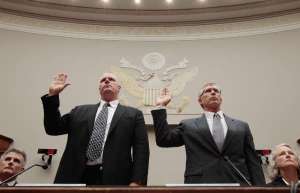
Solyndra CEO Brian Harrison, left, and CFO Bill Stover, at a Congressional hearing. Credit: Chip Somodevilla / Getty Images News
The story around Solyndra—the failed solar company that took hundreds of millions in government loan guarantees—is not getting better for greens. Earlier this week Solyndra CEO Brian Harrison let Congress know through his lawyers that he wouldn’t be answering any questions at a House investigation hearing set forFriday. “Mr. Harrison intends to invoke his Fifth Amendment rights in response to any questions asked by this subcommittee and will not provide testimony,” Walter Brown, a lawyer representing Harrison, wrote on September 20 to the Congressional House Energy and Commerce Committee.
Of course, every American citizen has the right not to give self-incriminating testimony, so we shouldn’t infer anything from Harrison’s withdrawal—although, you know, we probably will. (A Solyndra spokesperson maintained that the company was unaware of any wrongdoing on the part of its officers, directors or employees, and tried to divert blame towards the Department of Energy for refusing to help keep them out of Chapter 11.) At the brief Congressional hearing this morning, Harrison and Solyndra CFO Bill Stover repeatedly refused to answer questions put forward by committee members, like this one from Republican Lee Terry of Nebraska:
Was the White House duped by Solyndra, or did they ignore the information to put green energy in a better light, or for more onerous reasons?
More from TIME: Solyndra and the Green Jobs Fantasy
As the New York Times concludes in a front-page piece today, the White House and Department of Energy were guilty of missing signs that Solyndra was not all it was cracked up to be—but there’s little evidence so far of more nefarious motivations. Pressed to get money out fast as part of the stimulus—and lobbied by Solyndra itself—Energy officials made a bad call:
Administration officials lay the blame for Solyndra’s problems in part on the global collapse in the price of solar energy components, which forced the company to sell its innovative solar panels at less than it cost to make them. Some lawmakers on Capitol Hill question whether the firm’s executives may have engaged in a cover-up of their precarious financial condition, allegations the company denies.
But industry analysts and government auditors fault the Obama administration for failing to properly evaluate the business proposals or take note of troubling signs already evident in the solar energy marketplace.
More from TIME: Solyndra Scandal Is Washington Business as Usual
I spoke with Michael Butler, the CEO of the investment bank Cascadia Capital, and he agreed. Solyndra’s solar modules didn’t use silicon—and a couple of years ago, when the loan guarantees were being considered, silicon prices were high and the company’s business model might have seemed sound. Silicon prices fell sharply, and suddenly Solyndra was at a major competitive disadvantage—a turn of events that led directly to its collapse.
Unlucky, perhaps, but Butler believes Energy officials should have seen it coming. “Most market people thought that silicon prices were going to fall,” he says. “This was not a hard call.”
Expect to see Republican leaders continue to hammer the White House over the Solyndra debacle, perhaps even demanding that the money spent on the company be offset by spending cuts elsewhere. Apparently it doesn’t matter that there is ample evidence of Solyndra critics pushing for renewable energy money for projects in their own districts. Last year Republican Darrel Issa of California, who has helped lead the attack on Solyndra, asked Energy Secretary Steven Chu asking for a government loan for Aptera Motors, a California electric-car maker. And there’s been no call by Republicans to scale back on loan guarantees for nuclear power projects—even though far more money is at stake, and nuclear plants are beset with cost overruns.
More from TIME: Green Jobs Vs. Brown Jobs
Still, as Republicans will use Solyndra’s failure to discredit the entire Obama effort to support renewable energy companies—a criticism TIME’s own Massimo Calabresi agrees with—and they will likely be successful. Rhone Resch, who heads the Solar Energy Industries Association, put it bluntly: Solyndra could be renewable energy’s Enron:
It’s going to be very similar to Enron’s legacy in the oil and gas industry. Just in the sense of a history that flared out fairly quickly and fairly publicly.
That’s too bad because the solar industry—like renewable energy more broadly—is going to be a growing source of jobs for the future. It won’t always be smooth—Butler, like many other industry observers, sees solar going through a Darwinian shakeout that will hurt smaller, weaker firms. But if we stop playing now, we could forfeit enormous growth in the future.
More from TIME: Cloudy Days for Solar
Bryan Walsh is a senior writer at TIME. Find him on Twitter at @bryanrwalsh. You can also continue the discussion on TIME’s Facebook page and on Twitter at @TIME


